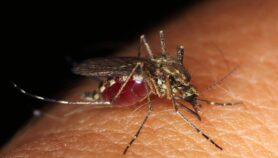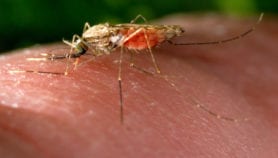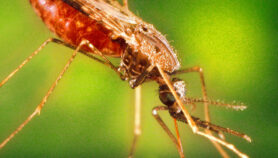By: Mićo Tatalović
Send to a friend
The details you provide on this page will not be used to send unsolicited email, and will not be sold to a 3rd party. See privacy policy.
Bednets and drugs will influence the spread of malaria far more than will climate change, according to a study that challenges fears that warming will aggravate the disease in Africa.
Many researchers have predicted that rising temperatures will cause malaria to expand its range and intensify in its current strongholds.
But unlike usual models, which aim to predict how climate change will affect malaria in the future, researchers looked at how warming affected the disease throughout the last century.
The researchers — whose work was published in Nature yesterday (20 May) — found that despite global warming, the prevalence of malaria decreased, which they attribute to disease and mosquito control programmes.
There is heated debate about how global warming will affect malaria in the coming decades (see Climate change ‘could reverse malaria patterns’) with some researchers "deeply entrenched" in their views that warming will lead to the disease’s expansion, said Peter Gething, lead author of the study and a researcher at the UK-based University of Oxford.
"[But] if we were to go back to the 1900s with the correct climate change predictions for the 20th century, modellers would predict expansion and worsening of malaria and they would have been wrong, and we believe they are wrong now," he told SciDev.Net.
But Matthew Thomas, researcher at Pennsylvania State University, United States, said that the study "plays down the potential importance of climate [change]".
"It is very easy to come up with a superficial model," he said, adding that this controversial area requires better science and more investigation of basic biology before reaching any firm conclusions about climate effects on malaria.
He pointed out that the Nature study predicts a background expansion and intensification of malaria, which needs to be taken into account when designing approaches to the disease.
"Drug and insecticide resistance could make future interventions less effective," he added, and so even small effects of climate have to be seen in that context.
He said that the malaria map published in Nature shows that in some areas malaria has in fact increased with global warming, in spite of overall decline over the last century. The map shows such areas in Latin America, South and South-East Asia, and Sub-Saharan Africa.
"If I was in a village where malaria went up, it would matter to me and I would want to know why it happened.
"The other problem is that the influence of environmental factors on specific biological mechanisms involved in malaria transmission is still very poorly understood," Thomas told SciDev.Net.
And Kevin Lafferty, researcher at the University of California, Santa Barbara, who controversially questioned the assumption of a link between climate change and malaria last year (see Debate erupts over effects of climate change on disease) said that the paper "overstates" the case against a global increase in malaria transmission. Other factors indirectly connected with climate change, such as population movement, "could certainly increase transmission", he said.
References
Nature, 465, 342 (2010)













